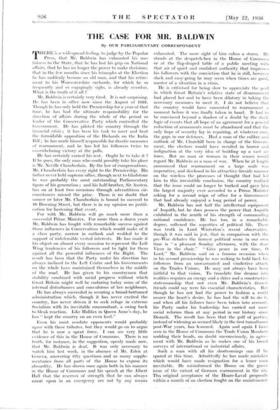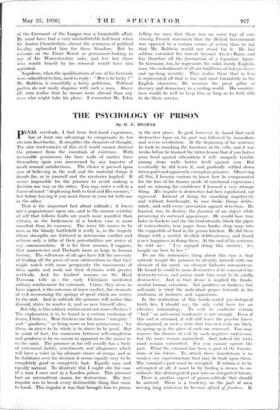THE CASE FOR MR. BALDWIN
By OUR PARLIAMENTARY CORRESPONDENT TIIERE is a widespread feeling, to judge by the Popular Press, that Mr. Baldwin has exhausted his use- fulness to the State, that he has lost his grip on National affairs, that he has no longer the power to make decisions; I hat in the few months since his triumphs at the Election he has suddenly become an old man, and that his.retire- ment to his Worcestershire orchards, for which' he so frequently and so engagingly sighs, is already overdue. What is the truth of it all ?
Mr. Baldwin is certainly very tired. It is not surprising. Ile has been in office now since the August of 1931.
Though he has only held the Premiership for a year of that Time, he has had the ultimate responsibility for the direction of affairs during the whole of the period as leader of the Conservative Party which controlled the Government. He has piloted the country through the financial crisis ; it has been his task to meet and beat I he formidable opposition of the Diehards on the India ; he has made himself responsible for drastic measures of rearmament, and he has led his followers twice to overwhelming victory at the polls.
He has certainly earned his rest. Ought he to take it ? I' he goes, the only man who could possibly take his place is Mr. Neville Chamberlain. By the law of compensations, Mr. Chamberlain has every right to the Premiership. His rather never held supreme office, though next to Gladstone he was probably the most outstanding Parliamentary figure of his generation ; and his half-brother, Sir Austen, has on at least two occasions through adventitious cir- cumstances missed the prize. There is no doubt that sooner or later Mr. Chamberlain is bound to succeed to 10 Downing Street, but there is in my opinion no justifi- cation for hastening that event.
For with Mr. Baldwin %rill go much fibre than a successful Prime Minister. For more than a dozen years Mr. Baldwin has fought with remarkable success against . those influences in Conservatism which would make of it a class party, narrow in outlook and wedded to the support of indefensible vested interests. He has made it his object on almost every occasion to represent the Left Wing tendencies of his followers and to fight for them against all the powerful influences of the Right. The result has been that the Party under his direction has always inclined to the Left Centre and his Governments on the whole have maintained themselves in the middle of the road. He has given to his countrymen that stability combined with social progress without which Great Britain might well be enduring today some of the internal disturbances and convulsions of her neighbours. He has always succeeded in securing a broad-bottomed administration which, though it has never excited the country, has never driven it to seek refuge in extreme Socialism with its inevitable concomitant, a swing back to bleak reaction. Like Halifax in Queen Anne's day, he has " kept the country on an even keel."
Even his most resolute opponents would probably agree with these tributes, but they would go on to argue that he is now a spent force. I can see very little evidence of this in the House of Commons. There is no truth, for instance, in the suggestion, openly made now, that Mr. Baldwin is deaf. It was only necessary to watch him last week, in the absence of Mr. Eden at Geneva, answering fifty questions and as ninny supple- mentaries from all parts of the House to expose its absurdity. He has shown once again both in his manner in the House of Commons. and his speech at the Albert Hall that the reserves of strength that he can always count upon in an emergency are not by any means exhausted. The mere sight of him calms a storm. He stands at the despatch-box in the House of Commons or at the flag-draped table of a public meeting with that air of quiet and confident authority that impresses his followers with the conviction that he is still,- however slack and easy-going he may seem when times arc good, master of a situation in a crisis.
He is criticised for being slow to appreciate the peril in which Great Britain's relative state of disarmament had placed her and to have been dilatory in taking the necessary measures to meet it. I do not believe that the country would have consented to rearmament a moment before it was finally taken in hand. It had to he convinced beyond a shadow of a doubt by the stark logic of events that all hope of an agreement for a general reduction of armaments must be abandoned and that the only hope of security lay in repairing, at whatever cost, the gaps in our defences. Had a man of the calibre and outlook of Mr. Churchill been in charge of the Govern ment, the electors would have recoiled in horror and indignation at the very idea of. building up a vast air force. But no man or woman in their senses would regard Mr. Baldwin as a man of war. When he at length announced that rearmament on a large scale was imperative, and disclosed in his attractive fireside manner on the wireless the processes of thought that had led him to this irresistible conclusion, the country realised that the issue could no longer be burked and gave him the largest majority ever accorded to a Prime Minister asking for a second reign of office for a Government that had already enjoyed a long period of power.
Mr. Baldwin has not half the intellectual equipment of Asquith, but he does possess the power that Asquith exhibited in the zenith of his strength of commanding national confidence. He has too, in a remarkable degree, softened the asperities of political life. There was truth in Lord Winterton's recent observation, though it was said in jest, that in comparison with the pre-War debates the fiercest political scene in our own time is " a pleasant Sunday afternoon, with the dear Vicar in the chair." " Give peace in our time, () Lord," Mr. Baldwin said on a .famous occasion when in his second premiership he was seeking to hold back his followers from an unwarranted and vindictive attack on the Trades Unions. He may not always have been faithful to that vision. To translate fine dreams into realities requires an energy and a drive and a constructive statesmanship that not even Mr. Baldwin's firmest friends could say were his essential characteristics. But though he has not had the power to fashion a world nearer the heart's desire, he has had the will to do it, and when all his failures have been taken into account, his Party under his leadership has carried out more social reforms than at any period in our history since Disraeli. The result has been that the gulf .of parties, instead of widening as seemed likely in the first tumultuous post-War years, has lessened. Again and again I have seen in the House of Commons the Trade Union Members nodding their heads, no doubt unconsciously, in agree- ment with Mr. Baldwin as he makes one of his broad surveys of international or industrial affairs.
Such a man with all his shortcomings can ill be spared at this time. Admittedly he has made mistakes which would have made resignation for a lesser man inevitable. He misinformed the House on the grave issue of the extent of German rearmament in the air. Tho original acceptance of the Hoare-Laval proposals within a month of an election fought on the maintenance of the Covenant of the Le.aque.,was a lamentable affair. He must have had a very uncorafortable half-hour when Sir Austen Chamberlain, almost the synonym of political loyalty, upbraided him for these blunders. But he remains on the Front Bench as permanent-looking as one of his Worcestershire oaks, and few but those who would benefit by his removal would have him uprooted.
Napoleon, when the qualifications of one of his Generals were submitted to him, used to reply : "But is he lucky ? " Mr. Baldwin is essentially a lucky politician. Political parties do- not easily dispense with such a man. Above all, men realise that he means more abroad than any Man who might take his place. I remember Mr. Eden telling me once that, there was no surer way of con- vincing French statesthen that the British Government was opposed to a certain course of action than to say that Mr. Baldwin would not stand for it. He has seldom extended his travels beyond Aix-les-Bains and has therefore all the fascination of a legendary figure. To Germany, too, he represents the solid, sturdy English- man, the embodiment of all our traditions of hide" ealenee and age-long security. They realise there that in him is represented all that is line and most formidable in the English character. lie remains the great pillar of decency and democracy in a reeling world. His country- men would do well to keep him as long as he feels able to do them service.



















































 Previous page
Previous page